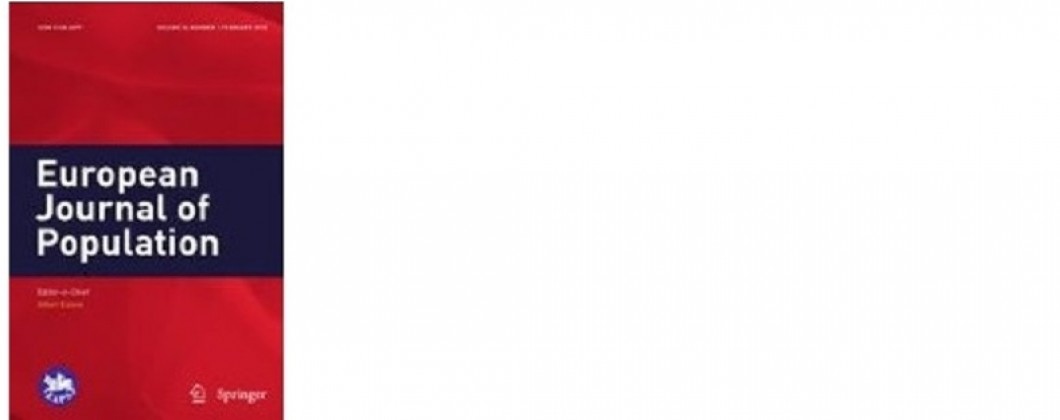European Journal of Population

The European Journal of Population addresses a broad public of
researchers, policy makers and others concerned with population
processes and their consequences. Its aim is to improve understanding of
population phenomena by giving priority to work that contributes to the
development of theory and method, and that spans the boundaries between
demography and such disciplines as sociology, anthropology, economics,
geography, history, political science, epidemiology and other sciences
contributing to public health.
The Journal is open to authors from all over the world, and its articles cover European and non-European countries (specifically including developing countries) alike.
The European Journal of Population is published under the auspices of EAPS by Springer Nature Publishers.
EAPS is proud that its flagship Journal is fully open access! This new status makes it even more
attractive to submit to our Journal. In addition to full Open Access, we are also proud that, in a joint effort with Springer Nature Publishers, EJP guarantees Equal Access Opportunities to ALL potential authors! Read more here
Call for proposals for a special issue "Mortality dynamics in low-mortality countries: what’s up?"
This special issue aims to cover complementary perspectives to improve our understanding of mortality dynamics in low-mortality countries, including socioeconomic differences, differential impact in age-at-death distributions, cross-country differences, or cause-of-death dynamics. Empirical contributions adopting novel approaches will be welcome.
We welcome authors to submit an extended abstract for the SI. The accepted article proposals will be invited to submit the full paper within a few months.
The article proposal for the SI should be submitted to the editor-in-chief of EJP (trude.lappegard@sosgeo.uio.no).
The proposal has to include:
-Title and a short abstract of maximum 200 words summarizing the proposed article;
-the names and affiliations of the author(s);
-a 2-4 pages abstract of the proposed article including information on the study’s novelty, its relevance to the SI, theoretical framework, data, methods and expected or preliminary results.
If you have any further queries, please contact EJP editor-in-chief Trude Lappegård via trude.lappegard@sosgeo.uio.no.
Deadline: 15 September 2024.
The Editors/Editorial Team
The Editorial Team is key to the success of the Journal. The Publisher and EAPS jointly decide on the composition of the team, including the selection of the Editor-in-Chief and any Associate Editors.
- Trude Lappegård, University of Oslo (Norway), Editor-in-Chief
- Bruno Arpino, University of Padua (Italy), Associate Editor
- Aude Bernard, University of Queensland (Australia), Associate Editor
- Danilo Bolano, Bocconi University (Italy), Associate Editor
- Peter Fallesen, Rockwool Foundation (Denmark), Associate Editor
- Ewa Jarosz, Faculty of Economic Science, University of Warsaw (Poland), Associate Editor
- Mathias Lerch, Ecole Polytechnique Fédérale de Lausanne (Switzerland), Associate Editor
- Julia Mikolai, University of St Andrews (United Kingdom), Associate Editor
- Eleonora Mussino, Stockholm University (Sweden), Associate Editor
- Marília Nepomuceno, Max Planck Institute for Demographic Research (Germany), Associate Editor
- Ariane Pailhé, Institut National d'Etudes Démographiques (France), Associate Editor
- Roberta Rutigliano, University of Basque Country (Spain), Associate Editor
- Sergi Trias-Llimos, Centre d'Estudis Demogràfics (CED) (Spain), Associate Editor
- Axel Peter Kristensen, University of Oslo (Norway) Editorial Assistant
Editorial Board
The Editorial Board reflects the involvement and commitment of the scientific community in the Journal. The Publisher and EAPS jointly decide on the mandate, tasks and composition of the Editorial Board.
Membership of the Editorial Board is based on scientific merit and commitment to the Journal and is not restricted to EAPS members.
Elena Ambrosetti, La Sapienze University, Italy
Annette Baudisch, University of Southern Denmark, Denmark
Francesco Billari, Bocconi University, Italy
Wanda Cabella, Universidad de la Republica, Uruguay
Giancarlo Camarda, Institut national d'études démographiques INED, France
Teresa Castro Martin, Spanish National Research Council, Spain
Agnieska Chlon-Dominczak, Warsaw School of Economics, Poland
Martin Drive, Lund University, Sweden
Albert Esteve, Centre d'Estudis Demografics CED, Spain
Ann Evans, Australian National University, Australia
Jane Falkingham, University of Southampton, United Kingdom
Anne Gauthier, Netherlands Interdisciplinary Demographic Institute NIDI, The Netherlands
Pavel Grigoriev, Federal Institute for Population Research BiB, Germany
Leiwen Jiang, Shanghai University, China
Martin Klesment, Tallinn University, Estonia
Martin Kreidl, Masaryk University, Czech Republic
Michaela Kreyenfeld, Hertie School, Germany
Daniel Lichter, Cornell University, United States of America
Wolfgang Lutz, International Institute for Applied Systems Analysis IIASA, Austria
Torkild Lyngstad, University of Oslo, Norway
Anna Matysiak, University of Warsaw, Poland
Melinda Mills, Oxford University, United Kingdom
Clara Mulder, University of Groningen, The Netherlands
Gerda Neyer, University of Stockholm, Sweden
Nkechi Owoo, University of Ghana, Ghana
Tomáš Sobotka, Vienna Institute of Demography VID, Austria
Aïda Solé Auró, Universitat Pompeu Fabra, Spain
Zsolt Spéder, Hungarian Demographic Research Institute, Hungary
Oliver Thevenon, Organisation for Economic Cooperation and Development, OECD, France
Emilio Zagheni, Max Planck Institute for Demographic Research MPIDR, Germany
